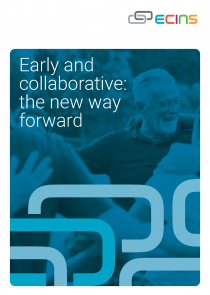Cambridgeshire Constabulary have been successfully using ECINS to run a Conditional Cautioning initiative aimed at helping low-level offenders make amends for their crimes and avoid a court hearing.
ECINS’ Heather Ette spoke to Emma Taylor, Investigation Management Unit Operator, about the scheme and how it is saving time and effort by bringing all the team’s tasks and activities under one roof.
Emma said “Referrals come in to the Demand Hub from Cambridgeshire Police Officers and the information is then entered on to ECINS. Working with the Liaison and Diversion Scheme East of England, we identify an offender’s issues and appropriate conditions are set, including the timeframe in which it needs to be completed by. The profile is assigned a case which is signposted to agencies so that external support can be offered to the offender, in line with their specific needs.
“When the condition or conditions are met, the case is finalised and there is no prosecution. If however, the conditions are not complied with, a prosecution may follow.
“We work with a range of agencies in the Demand Hub to ensure effective support can be provided at the right time. These agencies include the Drug and Alcohol team Inclusion and Outside Links which offer a range of support including housing, finance, benefit and debt support, employment training, education and assistance for people who do not have a postal address or a doctor/dentist. They can also assist individuals with accessing support agencies such as food banks and help with form filling.
“The Dawn Project is another agency involved in the partnership and they work with women offenders and ex-offenders as well as very vulnerable women. Through the Dawn Project the Offender Hub are able to provide a wide range of support to female offenders with conditional cautions including finding suitable accommodation, coping with health issues; including anxiety, stress, low self esteem or anger, coping with relationships or being a parent, violent relationships or sexual abuse and issues around prostitution.
“The aim of the conditional caution is to address the offender’s underlying issues to help prevent them from getting involved in crime again, it also allows for reparation to be made to the victim.
“As such the Conditional Cautioning partnership also includes Restorative Justice. A multi-agency virtual RJ Hub has been set up by the Constabulary, funded by the PCC to act as a single point of contact for RJ enquiries. This bespoke model works alongside the Constabulary-run Cambridgeshire Victims’ Hub and is part of the wider integrated model of support services for victims of crime.
“The RJ Co-ordinator will assess all referrals to RJ, no crime types are excluded, and then allocate a suitable facilitator. This could be from a bank of trained volunteers, who are trained and supervised by the Co-ordinator, or an experienced colleague from a partner agency.
“All of our Conditional Caution cases are managed on ECINS. We find it is a very efficient way of working as all the information is available to us for easy viewing. We can quickly prioritise the cases based on compliance and using the traffic light system on ECINS – red = high priority cases who have failed to comply with their conditions; amber = offenders who need some support to make sure they comply and green = currently complying.
“We task the agency and then monitor compliance via ECINS. The timescale is usually 12 weeks for the conditions to be complied with, if tasks are not met within the agreed timescale then we chase the partner agency to check the current status and manage all our communications securely on the system. If the offender breaches their condition then the offender will be referred back to the arresting police officer to prepare a file for court.
“There have been a number of people we have assisted through this initiative who are people in real need of help and support.” said Ms Taylor. “Giving individuals a conditional caution rather than a court hearing can help them to get their lives back on track as they have been able to identify and receive the support they need.
“One particular case where we were able to offer extended and joined-up support was when we had a vulnerable offender who, whilst at a drug meeting with one of our partners, had a mental health crisis and was a suicide risk. We were able to link his case from ECINS onto the investigation file on the police system ATHENA to flag up the incident. By adding the ECINS case ID onto ATHENA, the MASH team were alerted to his vulnerability and were able to approach us to access the case file for more information.
“By working with a range of support agencies via ECINS we are able to see specific details relating to how individual’s meetings with partners have transpired which gives us a much richer picture of an individual’s situation. Crucially, it enables us to offer a second chance to people, give them tailored and individual support and hopefully divert them from re-offending.”


